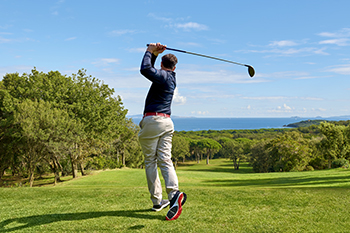
Golf, a sport renowned for its precision and finesse, demands proper foot and ankle protection to optimize performance and prevent injuries on the course. As golfers traverse various terrains and weather conditions, selecting appropriate footwear is vital. Choose golf shoes with sturdy yet flexible soles that provide traction on grass and uneven surfaces, ensuring stability during swings and walks. Look for designs with ample cushioning and arch support to mitigate the impact of repetitive motions and reduce the risk of foot fatigue or discomfort throughout the round. Consider weather-resistant options to keep feet dry and comfortable in inclement conditions. Additionally, prioritize shoes that offer ankle support to minimize the risk of sprains or twists during swings and uneven terrain navigation. Regularly inspect and replace worn-out footwear to maintain optimal protection and performance. By investing in quality golf shoes that prioritize foot and ankle protection, golfers can enhance their experience on the course and enjoy their game to the fullest. If you are seeking specific information about what type of shoes provide maximum protection while playing golf, it is suggested that you confer with a podiatrist.
Ankle and foot injuries are common among athletes and in many sports. They can be caused by several problems and may be potentially serious. If you are feeling pain or think you were injured in a sporting event or when exercising, consult with one of our podiatrists from Foot & Ankle Associates of Maine. Our doctors will assess your condition and provide you with quality foot and ankle treatment.
Common Injuries
The most common injuries that occur in sporting activities include:
- Achilles Tendonitis
- Achilles Tendon Rupture
- Ankle Sprains
- Broken Foot
- Plantar Fasciitis
- Stress Fractures
- Turf Toe
Symptoms
Symptoms vary depending upon the injury and in some cases, there may be no symptoms at all. However, in most cases, some form of symptom is experienced. Pain, aching, burning, bruising, tenderness, tightness or stiffness, sensation loss, difficulty moving, and swelling are the most common symptoms.
Treatment
Just as symptoms vary depending upon the injury, so do treatment options. A common treatment method is known as the RICE method. This method involves rest, applying ice, compression and elevating the afflicted foot or ankle. If the injury appears to be more serious, surgery might be required, such as arthroscopic or reconstructive surgery. Lastly, rehabilitation or therapy might be needed to gain full functionality in the afflicted area. Any discomfort experienced by an athlete must be evaluated by a licensed, reputable medical professional.
If you have any questions, please feel free to contact our office located in Brunswick, ME . We offer the newest diagnostic and treatment technologies for all your foot care needs.
